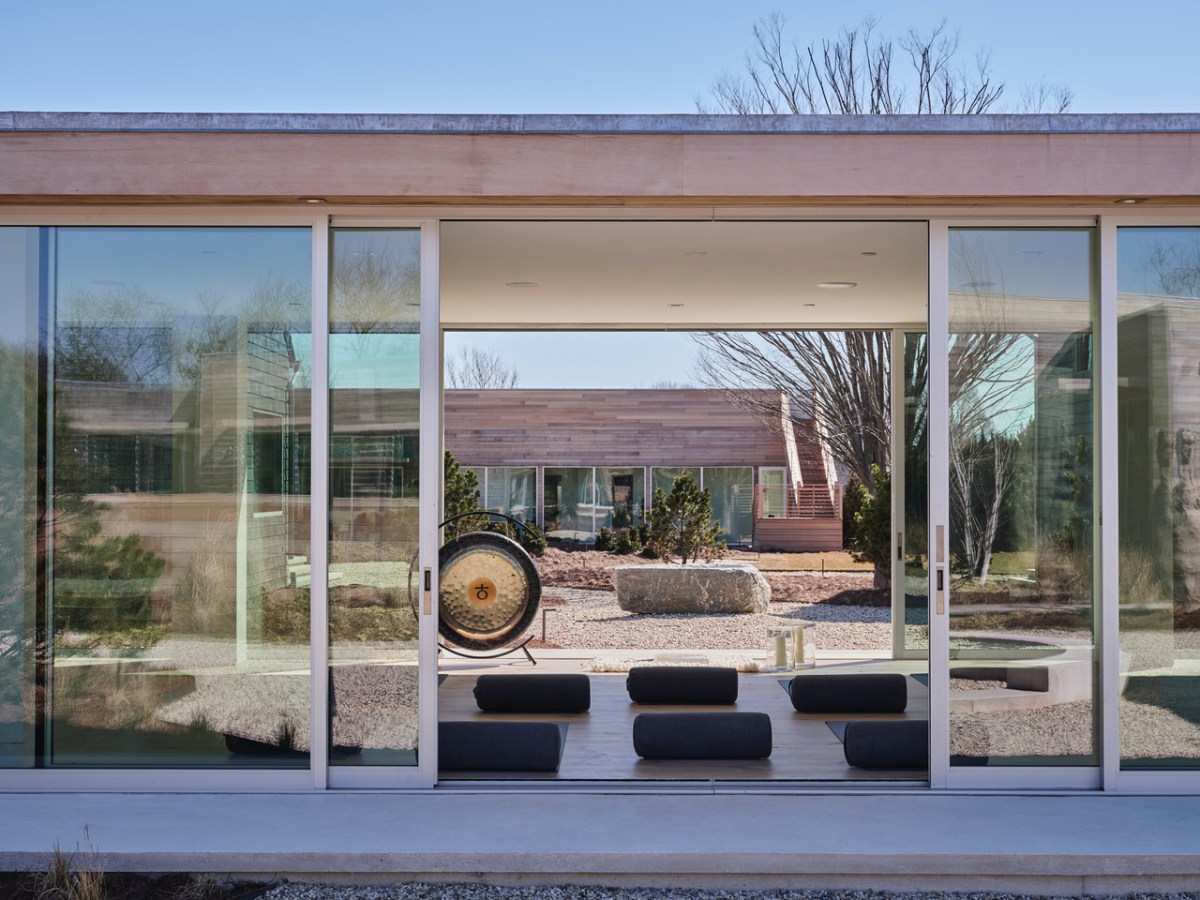[ad_1]
Many hotels in the Hamptons are all about the high-end beach life, with bright white oceanfront rooms and seafood restaurants and toes-in-the-sand bars. But Shou Sugi Ban House—a destination spa and wellness retreat in Southampton that recently expanded to include the Shou Sugi Ban Inn and Shou Sugi Ban Residences—offers a different kind of vibe. Set on five acres of land with more than 250 trees and 20,000 different kinds of grass, the 13-villa property is decidedly more serene nature sanctuary than sandy oasis, providing guests with a far greener Hamptons experience—and not just because of all the plants.

Founded by Amy Cherry-Abitbol, Shou Sugi Ban House puts sustainability high on the list of priorities. The property’s design is inspired by the Japanese principle wabi-sabi, an outlook that celebrates the “perfectly imperfect” by embracing flaws and appreciating the natural beauty of the world.

Though Cherry-Abitbol now resides in the Hamptons, she lived in Japan for many years and her two kids were born there—so she’s always felt a deep connection to and appreciation for Japanese culture and aesthetics. All of the villas are made from natural cedar, for example, and each one features a monochromatic color palette (mostly stone and biscuit tones) and a white oak Kobe-style bed made by the local design firm All Things Dirt.

There are also hinoki soaking tubs (made from the wood of the Japanese cypress tree) in many of the bathrooms, organic skincare products by the Kyoto-based brand Kotoshina, exclusive soaps crafted by SSBH in collaboration with Southampton Soap Company, chairs created with certified recycled wood, and cozy gas fireplaces adjacent to tokonomas (raised alcoves), which are a fixture in traditional Japanese homes. Shou Sugi Ban House is even named after the traditional Japanese craft shou sugi ban, which refers to the art of preserving wood by burning it first, and then finishing the charred pieces with oil.

Cherry-Abitbol and her business partner, Kathleen Kapnick, originally purchased the land in 2015 with the goal to create a green haven that blends global wellness philosophies with state-of-the-art well-being practices. Today, in addition to the 13 cedar studios, the ever-growing property also includes a saltwater pool, a Main Barn with a demonstration kitchen and a Healing Arts Barn with a tea bar, a treatment spa with a hydrotherapy circuit, a thermal suite, a solarium and roof deck.

There’s an open-air Movement Pavilion, a ceremonial fire circle, fitness center, dining orchard, multiple organic vegetable and herb gardens, and a curated library of sustainability-minded books like The Nature Principle by Richard Louv, Wise Trees by Diane Cook and Len Jenshel, and Sacred Plant Medicine by Stephen Harrod Buhner.

Guests can book custom stays, which include personalized wellbeing itineraries, or come for a couples or group retreat; stays are curated no matter the occasion. “We’ve created an experience that brings people back to a simple appreciation for their natural surroundings, allows for quiet contemplation and introspection, and fosters meaningful human connection in a tranquil setting,” says Cherry-Abitbol.
Perhaps most importantly, though—at least eco-wise—all of the buildings on the property integrate a geothermal system for heating and cooling, and there are solar panels on the barn that produce enough electricity to significantly reduce the property’s carbon emissions. The biodynamic gardens are also filled with native plant species, and there are undulating beds to distribute rainwater evenly to all of the vegetation, thus reducing the need for irrigation. Zooming out, Shou Sugi Ban House also does their part to support local organizations, an act that contributes to the overall sustainability of the larger community. They’ve partnered with local institutions like the Parrish Art Museum and the Watermill Center, and they regularly participate in community beach and trail clean-ups.

Not surprisingly, the food has gotten the green treatment, too. And it’s definitely a highlight. Cherry-Abitbol partnered with Mads Refslund, co-founder of the legendary Copenhagen restaurant Noma, who worked with a resident nutritionist to create balanced, hyper-seasonal and locally sourced (not to mention delicious) menus. Refslund is a strong believer in the “food is medicine” ethos, but does not sacrifice flavor in the process. Menus change daily depending on what’s fresh, but guests can expect creative and inventive dishes like zucchini flatbread with pumpkin seed butter and burgundy truffle, radish served with seaweed butter and yuzu, lemongrass chicken with stewed barley, and eggplant with miso and chili. Most of the ingredients are grown in the gardens on property, and the chefs visit the local farmers market to get nearly everything else they need.
In keeping with the “food is medicine” theme, the property is dry, but the vibe is so tranquil and soothing, alcohol almost seems out of place (though visitors can absolutely bring their own booze if they want). There are also 25 different teas available and, as one may expect, Japanese teas are the thing to get here. The chefs whip up delicious matcha, and the bancha—a lesser-known green tea that’s more of an everyday tea in Japan as opposed to the ceremonial matcha—is sourced from the Kyoto-based company Ippodo Tea, who’ve been providing high-quality Japanese green tea for nearly three centuries.

Ultimately, the beauty of Shou Sugi Ban House is that it’s a serene sanctuary that can certainly conjure up images of the Japanese countryside. Or it can just serve as a chill escape from modern life, one that’s as good for the body as it is for the soul—and better for the planet.
Images by Fredrika Stjarne for Shou Sugi Ban House
[ad_2]
Source link https://coolhunting.com/travel/the-tranquil-japanese-inspired-shou-sugi-ban-house/

Leave a Reply
You must be logged in to post a comment.